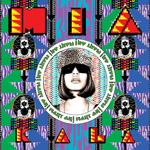
M.I.A.
Kala
(XL/Interscope; 2007)
By Peter Hepburn | 17 August 2007
Two years after Arular made her something of a household name (at least among hip households and New Yorker readers), M.I.A. is back with Kala. The record is a disappointment by almost any measure, even giving her some sophomore slack after a record as well received (rightfully so) as Arular was. Kala is the sound of a hugely creative, angry, head-strong young artist reaching well beyond her means, both musically and politically, and coming up short, though, to be fair, it still manages to contain a few of the best songs of the year.
That’s probably the place to start. The M.I.A. that so many of us fell head over heels for in late ’04 and ’05 was an anthem singer. Though Arular wasn’t pristine, she managed to construct two of the strangest, most appealing pop records outside of the Timbaland oeuvre with “Sunshowers” and “Galang,” a song that will incite delirious goofy dancing from almost anyone (myself included) for years to come. She had sex appeal, sure, and that was probably compounded by Third World appeal, but mostly she caught attention precisely because her music was totally different and very much her own thing. And her thing was funky as hell.
And for a while it looked like that was the M.I.A. we were getting back for Kala. The first glimpse most of us got was three of the four absolute bangers to be found here: “Bird Flu,” “XR2,” and “Boyz.” “XR2” is the closest the disc gets to the baile funk of Piracy Funds Terrorism, Vol. 1 or a few of the Arular cuts. The horns come hard, the beat is stupid-simple, and M.I.A. mumbles her way through in the best way — it takes verve to sound simultaneously vicious and half-awake. “Boyz” opens things up a bit more, sounding downright celebratory with the intertwining drum lines and pulsing horns. Neither of these got me ready for “Bird Flu,” a totally ridiculous and great track that I can’t imagine anyone but M.I.A. pulling off. The beat alone is a marvel; I have no idea how many percussive elements Switch, the track’s producer, managed to stuff in here, but he’s got to be pushing some sort of a record. M.I.A. takes it in stride, her snotty delivery and irreverence sounding perfectly at home within the chaos, motion, and color of the beat. It’s a definitive track. Or, at least, it should be.
The thing is, by the time you make it through Kala any sort of definition of who M.I.A. is or what she stands for seems indistinct at best. Throughout the album she bounces around with a manic pace, favoring a vast array of elements and influences in place of internal coherence. This could, if done well, work to her favor—a sort of willful eclecticism writ in neon. Many will be willing to accept it, no doubt; some may dub it cosmopolitan or forward-thinking. But despite every inclination to like the record, I find very little of redeeming value about either the individual songs or the album that they make up. She’s just grabbing at anything—her personal aesthetic, her political views —and trying to make it work like a fast-forwarded slide show.
Over the course of three tracks, for instance, she performs a note-for-note cover of a Bollywood song (“Jimmy”), shares an abysmal track with the rapper Afrikan Boy in which neither can muster more than a decent line or two (“Hussel”), and then, over a didgeridoo-sampling beat, performs with a group of aboriginal Australian youth (“Mango Pickle Down River”). Beyond the fact that all three songs are themselves bad, together they just don’t make any sense. She then follows it up with a track that samples New Order and quotes lines from Pixies (“20 Dollar”), and the only memorable things about the track are things that aren’t hers (“Bamboo Banger,” which quotes the Modern Lovers, manages to escape a similar fate, though not by much). It’d be a head-scratcher, but that would assume that I thought there was any sort of guiding logic to this record.
What happened to the sense of humor? The fun? Beyond the three tracks I mentioned earlier only one, the Clash-sampling “Paper Planes,” is really remarkable. The rest are passable, certainly, but hardly memorable. On Arular it felt like even the weaker tracks were at least exciting; here I’ll be surprised if anyone’s really getting worked up about “The Turn” or “World Town.” What happened to killer sex jam “Hit That” (a song that surfaced on-line earlier this year and is nowhere to be found on this record)? Why bother regurgitating sub par Timbaland collaboration “Come Around”? It wasn’t all that good when it appeared as a bonus track on his album, and it’s no better here.
It’s anyone’s guess where Maya Arulpragasam will take her music from here. If nothing else, Kala certainly shows that she’s still hungry. This record could never be called complacent; it’s too damn skittish. And that’s a problem, because even if some will likely continue to cite M.I.A.‘s genre centrifuge as her groundbreaking attribute, we shouldn’t forget that on Arular the effect was to mix everything together into something distinct and new. Here, everything is lobbed at you one after the other, and other than on a few tracks, M.I.A. just sounds like she needs some focus.





